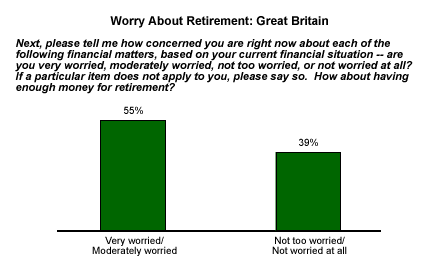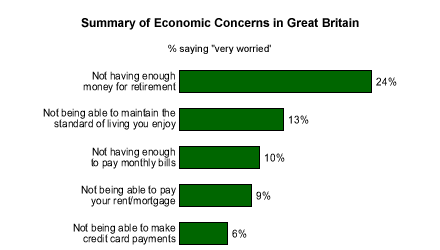More than half the adult population of Great Britain is anxious about retirement finances, according to a recent Gallup Poll. If that seems high, consider that 2 million pensioners in Britain live below the poverty line, and public pension spending in Great Britain is the lowest of any EU nation. Increasing life expectancy rates mean that even more savings will be needed as the retirement years stretch longer, and yet the collapse of equity markets in the United Kingdom has resulted in an estimated £160 billion deficit in private-sector pension funds.
As part of a continuing trend toward defined contribution plans in Britain, greater investment risk is being passed on to the employee, and final salary schemes will soon be a thing of the past. Faced with inadequate pensions, Britons cannot look to their personal savings either, with the British treasury reporting that half of all adults have less than £750 saved in liquid finances and 1 in 10 households have hardly any savings at all.
For all these reasons, the June 2003 Gallup Poll* finding that 55% of British adults are worried about not having enough money for retirement is well in line with the current economic reality.

The Savings Gap
According to a recent study by the Association of British Insurers, at the national level there is a £27 billion gap between the amount of money that Britons are currently saving and the amount needed for a comfortable retirement. And while policy-makers urge increased savings, the fact is that about one in four Britons -- nearly 13 million people -- live in poverty. One recent survey found that about 6.5 million adults go without needed clothing, such as winter coats, because of lack of money.
The June 2003 Gallup Poll reflects the magnitude of this problem in Britain where -- as in the United States and Canada -- worries about retirement outweigh all other financial concerns. Twenty-four percent of all British adults are very worried about not having enough money for retirement, more than twice as many as are concerned about being able to pay monthly bills, meet mortgage payments, or pay down credit card debt.

The Other Demographic Imbalance
According to the 2001 British Census, the over-60 age group accounts for more than 20% of the population, and will increase to 38% by 2050. While all of Europe struggles with the future burden that retirement needs of the baby boomer generation will put on pay-as-you-go Social Security systems and the resulting generational politics, a demographic disaster of another kind is in the making in Britain.
Women, who have longer life expectancies than men, represent 64% of the British pensioner population and generally have smaller retirement incomes to look forward to. A recent study found that for every 32p a female pensioner receives in retirement income, her male counterpart receives £1. Typically, British women earn much less on average than men do in the course of their careers, translating into lower pensions for them under the current system.
A high divorce rate, poor female participation in occupational pensions, and the fact that many women take time out of their careers for motherhood all catch up with them in retirement. Only one in four British women Gallup polled are "very worried" about money for retirement; this is the same as the national average number who expressed this concern. Given that one in four women in Britain live in poverty as compared to one in five men, and just how financially vulnerable British women are in retirement, it strikes me that that number should have been higher -- leading to questions about whether many women in Britain have enough access to financial expertise to even be aware of their predicament. Clearly, pension reform to address this demographic imbalance needs to be on the national agenda in Britain.
Bottom Line: The Boomers Ate My Lunch
But as legislation eases the way for more older Britons to stay in the workforce longer in the face of dwindling pensions, new concerns are bound to arise. If overwhelming retirement concerns cause younger workers, just starting families, to be denied jobs because aging baby boomers are forced to work as long as possible past the traditional retirement age, a whole new kind of generational politics may emerge in Britain. In any case, the impending retirement crisis is bound to reshape the British political and social landscape for decades to come.
*Results in the United States are based on telephone interviews with 1,018 national adults, aged 18 and older, conducted April 7-9, 2003. For results based on the total sample of national adults, one can say with 95% confidence that the maximum margin of sampling error is ±3 percentage points.
Results in Great Britain are based telephone interviews with 1,009 national adults, aged 18 and older, conducted June 4-19, 2003. For results based on the total sample of national adults, one can say with 95% confidence that the maximum margin of sampling error is ±5 percentage points.
In addition to sampling error, question wording and practical difficulties in conducting surveys can introduce error or bias into the findings of public opinion polls.
